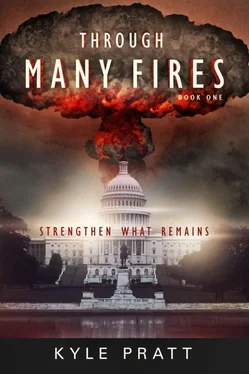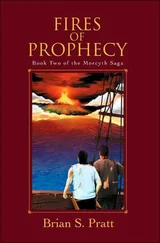Lisa glanced down. The radio? Was that the radio? The station it had been on was gone. Only crackle and static came from it now. She pressed search on the radio and down on the gas pedal.
Several cars sped past her.
She wanted to speed up, but was more afraid of an accident than any direct threat. Continuing south she topped several hills. Office buildings and empty parking lots gave way to houses and trees as she continued south away from Olympia. Still miles from home the more suburb setting looked familiar, but the abandon cars, burned out homes and empty neighborhoods continued the eerie surrealism. Still with no immediate threats she slowly eased off the gas.
“…back on the air using generator power.”
She gasped, startled by a voice from the radio.
“Reports are coming in that a mushroom cloud is rising over southern Puget Sound or the suburbs south of Seattle. We can’t see anything from our studio in Tacoma, but we are attempting to confirm it.”
Lisa sped up once again.
Moments later the announcer stated, “People heading south are confirming the attack and out-of-control fires spreading away from the blast zone toward Tacoma. From our studio we can see dark clouds and heavy smoke rolling across the nearby hills. We may have to evacuate the studio.”
Traffic had been light, but was now picking up as cars joined the flow south at each on ramp. Everyone who hadn’t fled the metro area just decided to leave. Thank you Peter, for giving me a head start. Then she recalled what the announcer had said about the location of the blast, south Puget Sound or the suburbs south of Seattle, and tears rolled from her eyes for her brother Peter and his wife Sue.
She wiped her cheeks and slowed as she rolled into the county of her birth. Two more small towns, then the exit for Hansen. She sighed, wiped her face and then swept her eyes along the sides of the road. She wondered why the destruction was greater here than it had been in Olympia. Gas stations and convenience stores were burned and looted along with nearby homes and shops. Pillars of smoke rose from the upcoming town.
She glanced down. Her gas gauge showed just over half. If she had been coming from Seattle she would be low on fuel by this time. She imagined the desperation of a family fleeing anticipated nuclear annihilation and arriving in a small town with not enough fuel to get wherever they might be going. I don’t have any food with me and only a few gallons of gas, but I’ve got family nearby.
Up ahead a motel parking lot was full of cars. Dozens of people wandered about the building and a nearby burned out gas station.
Tens of thousands drove here hoping to go on to relatives and friends beyond. How many didn’t make it? Did they run out of gas and walk or did they just stay here? How would they get food? Did they die?
A few miles down the road Lisa neared the Hansen exit. She scanned the ramp and overpass for danger. She could see men, women and children along the overpass and on either side. Many watched as she approached, but none appeared to be armed. She raced up the overpass and turned left.
Immediately people held out their hands urging her to stop. Others stepped into the road almost blocking her way. She swerved to avoid one person then another and another. The crowd pressed in slowing her to a crawl. They pulled on the locked doors. The car was barely moving now. Three burly men stepped into the road thirty feet ahead. One held a crowbar.
They want my car, my gas. I might be killed or…. She knew the road ahead was straight for several hundred yards. God help me. She closed her eyes and rammed her foot down on the gas pedal.
The car sputtered and then roared forward.
Bang.
Thump.
Screams of terror and angry yells filled her ears.
A second later she opened her eyes. The road ahead was clear and the windshield cracked. No, don’t look! Don’t look in the rearview mirror. Whatever is back there you don’t want to see it.
Lisa sped on as tears flowed. They should have gotten out of the way. They would have stolen my car. They might have killed me. She sobbed. I killed someone. I’m going to jail. More tears followed. The guard at the college, he said, don’t stop for anything. Lisa shook her head. No, it was a hit and run. They’ll throw me in prison. She took a deep breath and tried to stop crying, but within moments the cycle of self-recrimination and justification resumed.
Gradually the lack of people, rural setting and very familiar road gave comfort. She knew that Hansen was just a few miles ahead. I’ll talk to Dad when I get home. He’ll know what to do. With a big sigh she wiped away the last of the tears as the road descended into the river valley where the family had camped and picnicked many times. The forest was thick here and reached down to the shore of the lake only a mile ahead.
She rounded a gradual bend in the road and onto a causeway that crossed the lake. Almost home! Looking to the far bank she saw bulldozers parked across the road. She slowed the car to a crawl. Poles stood on either side with bodies hanging from them.
“What?” Caden interrupted his sister’s story. “You saw bodies, hanging from poles, at the blockade?”
Lisa crossed her arms. “I told you I ran down three men and you didn’t say a thing, but I say there were bodies at the blockade and you want clarification?”
Caden gestured, “Stop right there. When you hit those men you did what you had to do. I would have done the same.”
His mother nodded. “That’s what your father said.”
“How did you get home?” Caden asked.
She relaxed her arms. “I threw the car in reverse, turned around, and headed for the logging road south of the lake.”
Caden laughed. “We tried that road also. They must have pulled the culvert after you used it.” He thought for a moment. “I didn’t see any bodies at the blockade and I don’t remember any poles.” He turned to Maria. “Did you see anything?”
“No, there were no bodies, but we probably wouldn’t have noticed poles.”
“They were there,” Lisa said.
“I never saw it, but your father told me about it,” his mother added, “said it was a bad idea.”
Caden shifted on the bed. “I assume Sheriff Hoover is running town security.”
His mother and Lisa both nodded.
“I’ve never liked Hoover, but why would he hang corpses at the blockade? Has he gone crazy while I’ve been gone?”
“I think he’s desperate,” his mother said. “Nuclear bombs exploded in other parts of the country, and everyone was afraid it would happen here. People were fleeing south down every road from Seattle and Tacoma. I’m sure most were decent, but enough were willing to rob and kill….” She paused and shook her head. “Those that lived along the highway had their gas and food stolen. Cars were taken. The store and the church beside the freeway were both looted. Two deputies were murdered trying to restore order. The motel as you come into town is full of locals who lived near the interstate. They fled their homes, others were robbed and killed.”
Caden recalled his trip with the military convoy. “We saw the destruction along the freeway.”
“It started happening here. That’s when your father went to Sheriff Hoover and proposed the blockade. He suggested the locations and using heavy equipment or logs. He even helped man the blockade, in the beginning.”
Caden considered his options. Hoover had made it clear that interference was not welcome. Still, as the governor’s liaison, he felt he had some responsibility to inquire about the shootings.”
Читать дальше












